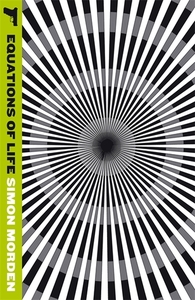Take a photo of a barcode or cover
So....uhhhh this book. I started out really liking it. There was a lot of action, the characters were interesting, and there were different aspects of the plot happening at the same time. However, in the middle section of the book, I began to lose interest. I felt that certain parts dragged on for a bit longer than necessary.
In the end, I kind of jumped back on the fan train for this book, and after much debate, I have decided that I will be attempting the sequel at a undetermined time in the future (probably awhile from now since I have A LOT to read (: ) So yeah, not saying you WON'T like this book, but you have to be willing to commit and keep on readin' in parts that might seem tedious! Hope everyone is enjoying their summer reading!!
In the end, I kind of jumped back on the fan train for this book, and after much debate, I have decided that I will be attempting the sequel at a undetermined time in the future (probably awhile from now since I have A LOT to read (: ) So yeah, not saying you WON'T like this book, but you have to be willing to commit and keep on readin' in parts that might seem tedious! Hope everyone is enjoying their summer reading!!
A real mixed bag. Lots of good ideas flying about, but plot wise the author throws too much into the mix. The main character is a nice blend of vulnerable and cynical, but the language is a bit leaden and limps along in places and doesn't serve the energised action. He has a heart condition and a pacemaker, yet is able to bring off many death-defying feats which stretched my credulity a bit too far. The first in a series, would I buy others? Probably not.
Love this post-Armageddon sci-fi tale. So reminds me of classic Azimov and Heinlen. Also really like the author's Mix of science and faith.
adventurous
dark
mysterious
medium-paced
Plot or Character Driven:
Plot
Strong character development:
Yes
Loveable characters:
Yes
Diverse cast of characters:
Yes
Flaws of characters a main focus:
Yes
A wildly imaginative dystopian thriller. It contained a little too much untranslated Russian for me, but I enjoyed the antics of the unusual anti-hero with a faulty heart and the tough as nails teenaged nun.
Let's start with the bad. It's a bit long-winded, especially for the first part of a trilogy, with more than a few dull passages that interrupt the flow. It also took a while for Morden's world of the Metrozone to come to form in my head (mystery is good, but sometimes exposition can be the friend you really need). However, the parts that do work work very well, and the eclecticism of the setting and its characters kept me coming back for more. Also: look at me, reading sci-fi!
Awesome world - post-some sort of an Apocalypse that's kept pretty vague in this novel, although there are references to nuclear fallout and radiation issues. The story takes place in a London that's had all of its parks converted into refugee camps, basically, filled with shipping containers turned into living quarters. The world is technologically-speaking not that far from our own - possibly because the Apocalypse came along and halted development for a number of years, I guess. There are hints that other things have changed, too, my favourite being one of the characters, a nun who identifies as a Joan. Yes, she carries weapons. That's pretty awesome. I can appreciate military nuns. There are also mafia, yakuza, physics doctoral students, weary cops....
Tragically, the story and the characters do not live up to the setting they are given. The story, of the repercussions when a student in the wrong place at the wrong time decides to act the hero, has great potential. How organised crime might work in such a world is a fascinating topic, especially when you add in the option of new and exciting technology and the clash of old and new morals and values. However, this one did not work well for me primarily because it chopped and changed too many times. I don't mind surprises, but they have to make sense in the context of the characters, rather than feeling like the next thing to be dumped on the reader because the plot was slowing down some.
The characters also let the story down. Petrovich, the main protag, is dull and whingy. So is Luke Skywalker for all of Episode IV. Luke though has the advantage of awesome supporting characters. Petrovich has Maddy, the nun; she started off well and just went downhill in terms of attitude and believability. There's the tired cop, probably the most amusing and realistic of the bunch, who gets little screen time, and the PhD student with whom Petrovich shares an office, who again had potential but barely has the dialogue to become a cameo let along anything else.
So. Disappointed? yes. Likely to read the next two in the series? No.
Tragically, the story and the characters do not live up to the setting they are given. The story, of the repercussions when a student in the wrong place at the wrong time decides to act the hero, has great potential. How organised crime might work in such a world is a fascinating topic, especially when you add in the option of new and exciting technology and the clash of old and new morals and values. However, this one did not work well for me primarily because it chopped and changed too many times. I don't mind surprises, but they have to make sense in the context of the characters, rather than feeling like the next thing to be dumped on the reader because the plot was slowing down some.
The characters also let the story down. Petrovich, the main protag, is dull and whingy. So is Luke Skywalker for all of Episode IV. Luke though has the advantage of awesome supporting characters. Petrovich has Maddy, the nun; she started off well and just went downhill in terms of attitude and believability. There's the tired cop, probably the most amusing and realistic of the bunch, who gets little screen time, and the PhD student with whom Petrovich shares an office, who again had potential but barely has the dialogue to become a cameo let along anything else.
So. Disappointed? yes. Likely to read the next two in the series? No.
Simon Morden's Equations of Life starts off with a bang, as the protagonist, Samuil Petrovitch foils a kidnapping attempt on the daughter of a Japanese Yakuza boss. He finds help in an unlikely source, a gun toting nun of a religious order based around defending their priests, and their adventures lead them up against a psychotic AI and the upcoming New Machine Jihad. In many ways Equations of Life is a standard cyberpunk novel, it contains a begrudging antihero, mobsters and Yakuza, an omniscient AI, a dystopian metropole future, and truck loads of violence. For those reason though I found Equations of Life entertaining, but not quite memorable. Samuil Petrovitch, as a Russian expat with balls of steel, is an entertainingly written character, and I appreciated that Morden only teased aspects of Petrovitch's backstory. By the conclusion of this novel you still do not know that much about Petrovitch's history, where he got his money from, why he was in London, or how he is such a genius. Petrovitch formulates the titular Equation of Life, but this does not seem to have much bearing on this novel's plot in anyway. Perhaps it comes up in the sequel, but honestly I found little exceptional in this novel to motivate me to read further.
Ah cyberpunk, how I've missed you! I picked this book up, admittingly, because of the op-art cover, so good marketing on the publisher's part. The story moved at a great pace, and like most cyberpunk, the story delved into everything from unified field theory to super computers to artificial intelligence. So how did this not fall into the same-ole same-ole that William Gibson has already written? Mostly it was due to the main character, a misanthropic genius with a checkered past and a bad heart. I look forward to the second book.





